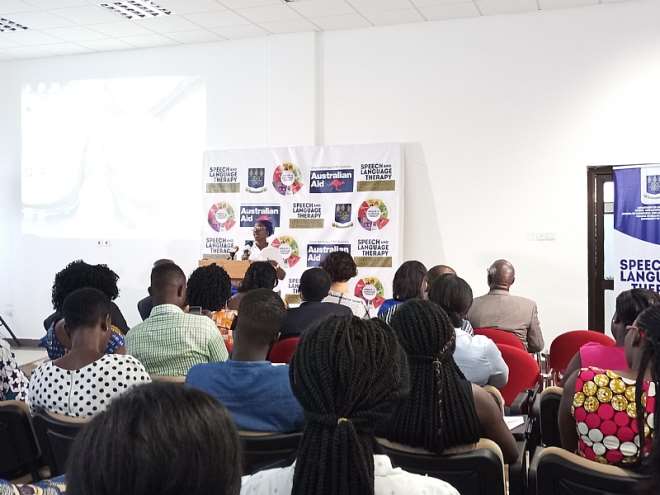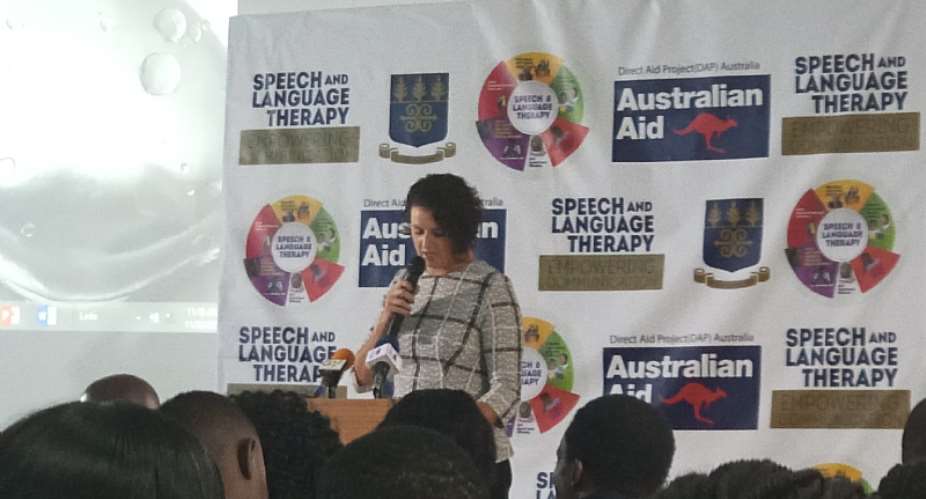While many people with communication disorders may have limited knowledge on the existence of Speech and Language Therapists (SLTs), rarely, only a handful finds it very lucky to access the services of the very few SLTs in Ghana.
Speech and Language Therapists are allied health professionals who provide treatment, support and care for children and adults who have difficulties with communication, or with eating, drinking and swallowing related to autism, cleft lip and palate deformities and stammering.
They also cater for patients recovering from stroke and major head and neck cancer surgeries, for which rehabilitation for speech, voice and swallowing will be required. The work of SLTs involves working with parents, carers and other professionals such as teachers, nurses, occupational therapists and doctors to provide essential services to children and adults with communication difficulties.
It is however, a cause for worry that, with the over millions of people living with various forms of communication disabilities, only seven SLTs currently exist in the country. Out of this, five of these SLTs are Ghanaian, trained in London. The remainder are foreigners, living and working in Ghana for various reasons, commonly on short placements of one year or less.
To bridge this gap, the Department of Audiology, Speech and Language Therapy of the University of Ghana with support from the Australian High Commission introduced Masters in Speech and Language Therapy program in August 2016.
The SLTs master’s programme, currently the only one in the sub-region will soon graduate 12 pioneering students who are on internship after the successful completion of their coursework.
Despite the generous support, the development of SLTs is still at an incipient stage as more attention is required by government to support the training of more SLTs in Ghana. Meanwhile, one thing that already poses as a challenge, is that job search by the few SLTs in Ghana has been an unending quest coupled with little or no placement as their work is often voluntary.
Speaking at a symposium in Accra under the theme, “Empowering Communication,” the Third Secretary of the Australian High Commission, Claire Maizonnier, on behalf of the Commissioner H.E. Andrew Barnes said communication and speech difficulties present enormous challenges to individuals and their families, particularly in this part of the world, where services for communication difficulties are extremely rare.
She noted that the Commission under its Direct Aid Program supported the work of the Speech and Language Therapy Department through providing GHS 42, 000 to train speech and language therapists (SLT) with appropriate clinical skills and evidence-based knowledge, applicable to the context of communication disability in West Africa.
“I am confident that the capacity building and skills transfer from Dr Wylie and Prof Davidson, along with the rest of the volunteers, will serve as a strong foundation on which the students and faculty of this great institution will build to bring hope for people with communication difficulties not only in Ghana but in the region,” Claire Maizonnier stated.
According to her, making the lives of people who are more vulnerable than us better is highly commendable, and indeed expected.
“You should be extremely proud of your achievements and remember that you are lucky to be among the few who receive a university education. It is your responsibility to use that education to improve your country and your world,” she opined.
The Programme Coordinator of the MSc in Speech and Language Therapy at the Department of Audiology, Speech and Language Therapy, College of Health Sciences, University of Ghana, Legon, Nana Akua Victoria Owusu indicated that the Department is poised to increase SLTs approximately to 30 by 2020.
She noted that SLTs who graduate in Ghana need skills relevant to the health, disability and cultural context of Ghana against the curriculum built by international volunteers.
Mrs. Owusu said the Department is stressing on developing protocols and guidelines as well as deepen their relationship with international organisations for exchange programmes.
She added that the programme aims to make research more attractive to students to encourage investigations into different local languages and related areas to help develop their own norms and assessment for diagnosis.
“Currently, the majority of assessments are Western based and not appropriate for use on local clients,” Mrs. Owusu intimated.
According to her, the drive towards rehabilitation and training will focus on students as trainer of trainers on clinical practices to increase awareness and improve access to information on SLT in Ghana.







 Akufo-Addo spotted ordering chiefs to stand for his handshake
Akufo-Addo spotted ordering chiefs to stand for his handshake
 Akufo-Addo ‘disrespects’ every chief in Ghana except Okyenhene — NDC Communicato...
Akufo-Addo ‘disrespects’ every chief in Ghana except Okyenhene — NDC Communicato...
 Supreme Court clears way for dual citizens to hold key public positions
Supreme Court clears way for dual citizens to hold key public positions
 Be transparent, don’t suppress the truth – Prof. Opoku-Agyemang to Jean Mensa
Be transparent, don’t suppress the truth – Prof. Opoku-Agyemang to Jean Mensa
 ‘I won’t tell the world I was only a driver’s mate during challenges’ – Prof Jan...
‘I won’t tell the world I was only a driver’s mate during challenges’ – Prof Jan...
 We’ll prosecute corrupt officials of Akufo-Addo’s govt – Prof Jane Naana
We’ll prosecute corrupt officials of Akufo-Addo’s govt – Prof Jane Naana
 [Full text] Acceptance speech by Prof Jane Naana Opoku-Agyemang as 2024 NDC Runn...
[Full text] Acceptance speech by Prof Jane Naana Opoku-Agyemang as 2024 NDC Runn...
 Election 2024: Don’t be complacent, we haven’t won yet – Asiedu Nketia cautions ...
Election 2024: Don’t be complacent, we haven’t won yet – Asiedu Nketia cautions ...
 Election 2024: Stop fighting over positions in Mahama’s next govt – Asiedu Nketi...
Election 2024: Stop fighting over positions in Mahama’s next govt – Asiedu Nketi...
 Prof Jane Naana Opoku-Agyemang will restore dignity of vice presidency – Fifi Kw...
Prof Jane Naana Opoku-Agyemang will restore dignity of vice presidency – Fifi Kw...
